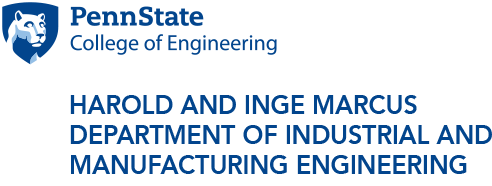
Bárbara Venegas is focused on helping advance the Service Enterprise Engineering Initiative at Penn State.
Chilean Fulbright Scholar passionate about Penn State SEE 360 Initiative
9/20/2017
UNIVERSITY PARK, Pa. — In 1908, Penn State established the first Industrial Engineering program in the world and has since produced leaders in industry, research and academia. It is this storied tradition of unparalleled excellence that persuaded Bárbara Venegas to travel over 5,000 miles to pursue her graduate education in the Harold and Inge Marcus Department of Industrial and Manufacturing Engineering (IME).
She came to Penn State following a six-year math-intensive program at Universidad de La Frontera in her home country of Chile. Currently a Service Enterprise Engineering Initiative (SEE 360) Fellow at Penn State, Venegas is mentoring undergraduate and master's degree students on service-related projects, which gives her important teaching experience as she continues her academic path.
Through her fellowship for the SEE 360 Initiative, Venegas works with Professors Vittal Prabhu and Jose Ventura to help raise awareness of the societal challenge in the United States where 80 percent of the workforce is employed in the service sector. The goal of the initiative is to examine the decision processes of service systems and apply engineering techniques in an effort to improve the productivity and quality within the service sector.
“One of the first areas that we focused on was restaurants, which I am familiar with due to work I did back in Chile at a kitchen equipment retailer,” said Venegas. “We had a branch that was dedicated to helping new restaurants set up their kitchens in an optimal way.”
Initially, the task of SEE 360 was to create a case study and present the concept in a class room setting. This original project has evolved and Venegas is now a teaching assistant for Prabhu’s class, Service Systems Engineering. Together, their goal is to create new classroom material that is relevant to what is going on right now in industry and make students aware of entrepreneurship opportunities in this field.
“Given that a huge percentage of Americans work in service industries, I think it is a great asset for students to learn about how to optimize those systems,” said Venegas.
When Venegas was in grade school, her brother explained that the highest paying jobs in her country were in industrial engineering. She always had a passion for problem solving and ultimately decided to pursue this option because it coincided with things she wanted to learn, such as supply chain analytics and management.
Venegas knew that the United States offered the best opportunities for achieving her goals in engineering. She discovered the Neale Silva Memorial Scholarship that the University of Wisconsin-Madison offers to two Chilean students each year. Upon receiving this award in 2010, Venegas fell in love with the American educational system while obtaining her bachelor’s degree in industrial engineering.
For her bachelor’s thesis, Venegas and her adviser worked with groups of small farmers in the south of Chile in an effort to form a supply chain strategic alliance between the non-commercialized groups. Their team developed a mathematical program based on real data that they collected and worked with government agencies in order to put the plan into action.
After earning her bachelor’s degree, Venegas went back to Chile and worked for the kitchen retailer, which she describes as a “toy store for chefs.” Eventually promoted to the position of purchasing manager, Venegas’ job focus was on sourcing and making alliances with suppliers.
It was there that Venegas developed a passion for making women feel empowered in the workforce.
“I think we can do anything. I know how it feels to be a woman in a room full of men, especially as an engineer,” said Venegas. “I like the idea of inspiring women and giving them the tools and skills they need to succeed.”
Venegas recalls a time she had to build a team from scratch at her previous job. She made it her goal to find qualified women, as she is aware of the intrinsic bias present in the corporate world in Chile to select males, and to an extent, in the United States.
Since coming to America, Venegas has challenged herself to develop exceptional people skills. She believes in the importance of making time to do the things that she loves, such as playing on a trivia team and making her own jewelry.
Venegas was awarded the prestigious Fulbright Scholarship in 2013 in order to continue her education. She also received support from an initiative proposed by Chilean President Michelle Bachelet called Becas Chiles, which provides funding for scholars to study at prestigious universities. After a year of preparation with the Fulbright advisers, Venegas was accepted into Penn State’s College of Engineering.
Venegas currently works with Ventura on supplier selection within a competitive environment. After her experience at the kitchen retailer, Venegas knows how difficult it can be to negotiate with large suppliers and focuses on anticipating what can be achieved from a certain negotiation. She has published one paper on the topic for her dissertation so far, “A two-stage supply chain coordination mechanism considering price sensitive demand and quantity discount.”
Venegas relies on kickboxing for stress relief while pursuing her doctorate and enjoys the company of friends at Central PA Mixed Martial Arts. After a 12-hour day in the lab, she enjoys going home to cook a meal using fresh vegetables and herbs from her garden.
When Venegas first got to Penn State, she thought she would want to be an academic in the future. Now, she feels that she may want to work in industry. While she was working for a small company, Venegas felt that whatever she did made a huge impact on the company’s profits.
“I don’t miss my job particularly. I miss seeing an immediate impact on the work I accomplish,” said Venegas.
Venegas hopes to work for a company that is future focused. She wants to look at where things are going and not maintaining the status quo.
“In companies that are still growing, I feel that your work has a greater impact than when you are doing a very particular job,” said Venegas. “Still, with hopes of continuing research, plans of becoming a faculty member are intact.”
With intentions of graduating in summer 2018, Venegas is thinking about how she can use the knowledge she has acquired to give back to the world around her.
“I feel that the reason why I received these opportunities is that it is a noble cause of which I should return the favor,” said Venegas. “I think making a valuable difference in my future is important and I look forward to it.”






